KARACHI: The Economist Intelligence Unit has ranked Karachi the second least safe city in the world after Myanmar’s Yangon on its Safe Cities Index 2021, with experts saying it wasn’t surprising given deteriorating health, security and climate conditions in the southern Pakistani port city.
The Safe Cities Index 2021 is the fourth iteration of the index, based on 76 indicators covering digital, health, infrastructure, personal and environmental security. The first such biennial report was published in 2015 but didn’t mention Karachi as it had only 50 cities.
In the next report published in 2017, the Pakistani port city was ranked as the least safe city, on 60th position. In the last index issued in August 2019, Karachi’s ranking improved and it was placed on 57th position, above Yangon, Caracas and Lagos.
This year, however, Karachi’s ranking dropped to 59 with 39.7 points in five categories. India’s New Delhi and Mumbai ranked 48 and 50, respectively. Copenhagen, Toronto, Singapore, Sydney and Tokyo are the top five safest cities in the world.
Health experts and analysts believe the grading is a reflection of reality. A spokesperson for the provincial government and the Karachi commissioner did not respond to repeated attempts to seek comment.
“The degradation is a reflection of the deteriorating situation of health in Karachi,” Dr. Qaisar Sajjad, secretary general of the Pakistan Medical Association, told Arab News. “We don’t see any steps which may make us see any better conditions in the future.”
Health and climate conditions had deteriorated with the passage of time, according to Sajjad, and the price of medical treatment had shot up manifolds in both public and private sector hospitals of the city.
“Government-run hospitals used to offer free treatment and would provide immediate health care, especially in case of emergencies,” Dr. Sajjad said, recalling a recent traffic accident at the city’s Liaquatabad flyover in which the injured died after four hospitals, two of them from the public sector denied him treatment. Government-run hospitals have also started charging heavily for tests and hospitalization, he noted.
Highlighting a lack of preventive steps by the government, the PMA secretary general said: “The sewerage system is fragile, pure drinking water is unavailable and there is abundance of mosquitos due to which health care facilities receive more patients of mosquito-borne diseases.”
Karachi has seen environmental degradation too and the city has transformed into a concrete jungle after massive cutting of trees, Sajjad said.
“There is noise and air pollution. Trash is not disposed of properly and it’s burnt instead. Car emissions are also adding to pollution in the city,” he said. “So, how can we be hopeful when we see deterioration in health and climate?”
In its report, the Economist Intelligence Unit said all categories were correlated and even when one was affected, it compromised the overall security of citizens. Experts agreed that all indicators presented a grim picture of the Pakistani port city and main financial hub.
“No serious efforts have been made for the security of the city,” Mazhar Abbas, a Karachi-based political commentator and analyst, told Arab News. “Around $124 million were spent on the safe city project in Islamabad, whereas $157 million were allocated for the Lahore Safe City Project. On the contrary, in Karachi, which is a much bigger city, only Rs600 million ($3.57 million) were spent to install cameras. It tells about our priorities for Karachi.”
Though a September 2013 paramilitary operation eliminated much violence from the city, no serious efforts had been made against street crimes, he said.
“Karachi is witnessing a surge in these crimes,” Abbas said. “Most of the criminals have been released on bail for as much as 12 times, but authorities don’t look at this issue scientifically.”
He said the dilapidated infrastructure was also adding to the lack of security for the city’s dwellers: “Karachi, which had few slums in the 1980s, is now home to over 8,000 shanty towns.”
The analyst said the Rangers paramilitary force had been deployed in Karachi as part of a temporary arrangement, but over the last several decades it started policing the city’s neighborhoods, while the police force was never reorganized or restructured to deal with modern-day challenges facing the city.
Experts call Karachi’s ranking as world’s second least safe city a ‘reflection’ of reality
https://arab.news/btvb5
Experts call Karachi’s ranking as world’s second least safe city a ‘reflection’ of reality
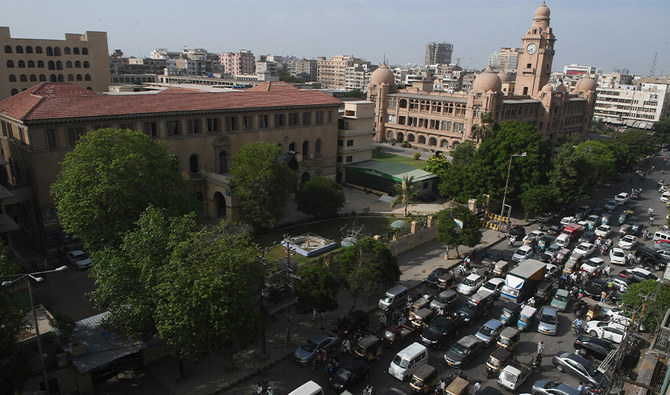
- Safe Cities Index 2021 is based on 76 indicators covering digital, health, infrastructure, personal and environmental security
- Experts agree that all indicators presented a grim picture of the Pakistani port city and main financial hub
Pakistan invites China to establish industrial zones for electric car manufacturing
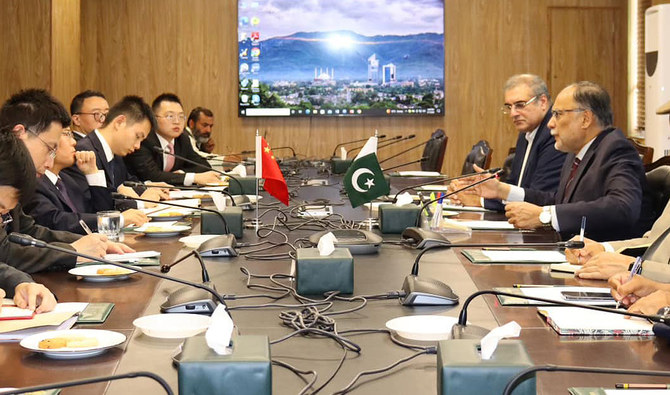
- Earlier this year, Pakistani car maker Sazgar Engineering unveiled electric car made in collaboration with China
- Road transport is significant contributor to pollution as around 23 percent of Pakistan’s greenhouse gases come from vehicles
ISLAMABAD: Pakistan’s planning minister has invited China to collaborate with Islamabad in setting up industrial zones to manufacture electric cars amid a renewed push to attract foreign investment, state news agency APP reported on Wednesday.
The government of Pakistan approved an ambitious National Electric Vehicles Policy (NEVP) in 2019 with the goal of electric vehicles comprising 30 percent of all passenger vehicle and heavy-duty truck sales by 2030, and an even more ambitious target of 90 percent by 2040. For two- and three-wheelers, as well as buses, the policy set a goal of achieving 50 percent of new sales by 2030 and 90 percent by 2040.
In a meeting with Chinese officials on Tuesday, Planning Minister Ahsan Iqbal invited them to collaborate on the production of electric cars.
“He emphasized Pakistan’s aim to establish industrial zones for the manufacturing of electric cars in collaboration with China, leveraging Pakistan’s competitive advantage to reduce overall production costs and create employment opportunities for Pakistani workers,” APP reported.
Earlier this year, Sazgar Engineering, one of Pakistan’s leading car manufacturers, unveiled the electric vehicle “ORA 3,” manufactured in collaboration with Chinese car manufacturer Great Wall Motors (GWM).
The urban areas of Pakistan exhibit some of the world’s highest levels of air pollution, primarily due to sub-2.5 μm particulate emissions. This issue significantly impairs both the country’s economy and the quality of life of its residents. Road transport is a significant contributor to air pollution as around 23 percent of Pakistan’s greenhouse gas emissions originate from vehicles.
On Tuesday, Prime Minister Shehbaz Sharif also met a delegation of Japanese industrialists in Islamabad and invited them to invest in Pakistan’s electric automotive industry.
“There is a wide potential for investment in the electric vehicle industry in Pakistan and Japanese companies with the best technology can take full advantage of it,” Sharif told the Japanese group.
Pakistan court orders Imran Khan’s wife to be moved from house arrest to Adiala Prison
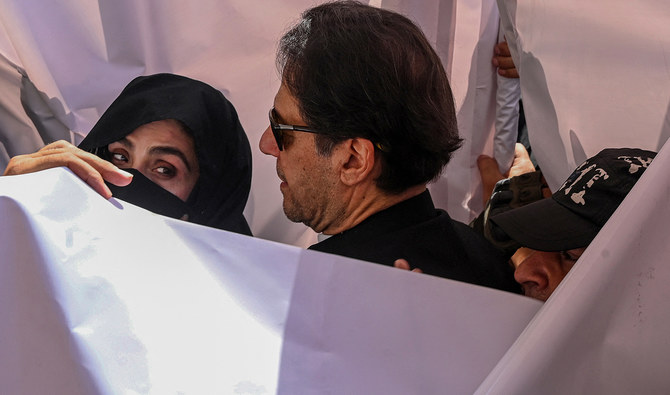
- Bushra Bibi had petitioned court to shift her from Bani Gala home to Adiala Jail where Khan is also imprisoned
- Bushra has been handed two sentences, 14 years in graft case and 7 years for violating Pakistan’s marriage law
ISLAMABAD: The Islamabad High Court (IHC) on Thursday ordered that ex-premier Imran Khan’s wife Bushra Bibi be transferred from her Banigala residence, declared a sub-jail, to Adiala Jail, where her husband is incarcerated.
Bushra has been living under house arrest at her husband’s sprawling Bani Gala mansion in Islamabad since Jan. 31 when both were sentenced to 14 years in prison in a case that relates to accusations they undervalued gifts from a state repository and gained profits from selling them while Khan was prime minister from 2018-22. Khan is jailed at Rawalpindi’s Adiala Jail.
In February, Khan and his wife were also sentenced to seven years on charges they violated the country’s marriage law when they wed in 2018 — the fourth sentence for Khan and the second for his wife.
Bushra had petitioned the court several months ago that she should be moved to Adiala and the IHC had reserved its verdict in the case on May 2.
“Court has annulled notification of house arresting former first lady Bushra Bibi at Bani Gala sub-prison and ordered her transfer to Adiala Prison,” Khan’s Pakistan Tehreek-e-Insaf political party said in a message to reporters.
During Thursday’s hearing when the court reserved its judgment, Bushra’s lawyer Usman Gill said after her sentencing in the state repository case by the trial court, his client went to Adiala Jail as per the trial court order which was also forwarded to the jail superintendent. But on the orders of the interior ministry, the chief commissioner issued an “illegal notification for transfer” to Bani Gala, the lawyer argued.
“There was no instruction from the authorities concerned regarding the transfer from Adiala Jail to Banigala,” he said.
“Neither the provincial government nor did the Punjab prisons inspector general issue any such directive [for transfer] … The place of imprisonment was to be determined by the trial court and not the chief commissioner.”
The state’s counsel argued that Bushra was moved to Bani Gala because of security threats.
“Were the 141 women who were brought to Adiala after Bushra less privileged?” the judge hearing the case asked, saying they too should be imprisoned at their homes then.
“Sometimes you say that [you] cannot present her [Bushra] in the court as there are threats and at times, you say that the jail is not secure. Are you secure?” the judge quipped. “If I am confined in my home by my own will, I would be very happy but how can a prisoner’s property be turned into a sub-jail against his will?”
The IHC subsequently reserved its verdict on the petition.
CASES
In a separate petition to the court filed last month, Bushar, a deeply religious woman widely believed to be Khan’s spiritual guide, alleged she was being poisoned through contaminated food and subjected to “mental and physical torture which is becoming a serious threat to her health and life.” She also alleged that her room and bathroom had been bugged and multiple hidden cameras installed in a “blatant violation of her privacy, dignity and honor.”
The petition said Bushra was only given ten minutes for meetings with family members and lawyers, with five jail staff supervising at all times.
Khan was first jailed after being handed a three-year prison sentence in August 2023 by the Election Commission for not declaring assets earned from selling gifts worth more than 140 million rupees ($501,000) in state possession and received during his premiership. In January, Khan and Bushra were handed 14-year jail terms following a separate investigation by the country’s top anti-graft body into the same charges involving state gifts.
An anti-graft court in Islamabad also handed Khan a 10-year jail term in January for revealing state secrets, a week before national elections on Feb. 8. The ruling on his marriage to Bushra and a seven-year sentence each for both also came ahead of the polls.
Khan has also been indicted under Pakistan’s anti-terrorism law in connection with violence against the military that erupted following his brief arrest related to the Al-Qadir case on May 9. A section of Pakistan’s 1997 anti-terrorism act prescribes the death penalty as maximum punishment. Khan has denied the charges under the anti-terrorism law, saying he was in detention when the violence took place.
Khan’s convictions, which mean he is banned from holding public office, ruled the 71-year-old out of the February general elections. Arguably Pakistan’s most popular politician, Khan says all cases against him are motivated to keep him out of politics.
Taliban reject Pakistan’s claim Afghan bomber involved in deadly attack on Chinese dam engineers
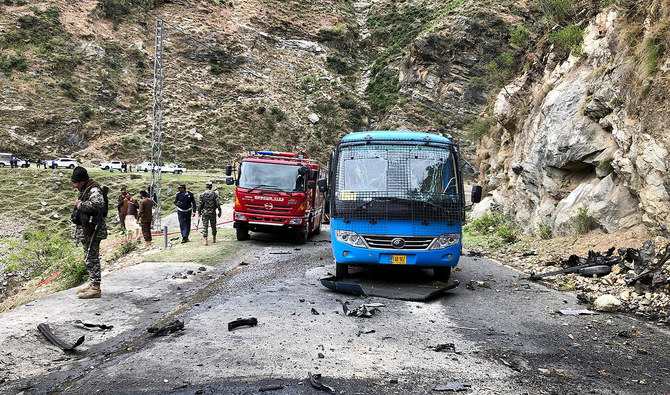
- Afghan defense ministry says the killings of Chinese nationals reflected the weakness of Pakistan’s security agencies
- Pakistan believes Kabul not doing enough to tackle militant groups, launched airstrikes targeting them in Afghanistan
KABUL: The Taliban defense ministry on Wednesday rejected Pakistan’s allegations that Afghans were involved in an attack on Chinese engineers, as ties between the neighboring nations sour amidst rising insecurity.
Pakistan’s military had said at a press conference on Tuesday that a suicide bomb attack in March in Pakistan’s northern Khyber Pakhtunkhwa province, that killed five Chinese engineers, was planned in neighboring Afghanistan, and that the bomber was an Afghan national.
“Afghans are not involved in such matters,” said Mufti Enayatullah Khorazmim, the spokesperson for Afghanistan’s Taliban-run Ministry of National Defense.
“Blaming Afghanistan for such incidents is a failed attempt to divert attention from the truth of the matter and we strongly reject it,” he added.
A suicide bomber rammed a vehicle into a convoy of Chinese engineers working on a dam project in northwest Pakistan in March, killing six people.
“The killing of Chinese citizens in an area of Khyber Pakhtunkhwa that is under tight security cover by the Pakistan Army shows the weakness of the Pakistani security agencies,” Khorazmim said.
Relations between Pakistan and Afghanistan have soured in recent months. Islamabad says Kabul is not doing enough to tackle militant groups targeting Pakistan and in March Pakistan carried out airstrikes targeting militants on Afghan territory.
Last year, Pakistan expelled nearly 370,000 undocumented Afghan nationals, saying the majority of suicide attacks against its security forces were carried out by Afghans, a charge Kabul rejected.
Pakistan’s military spokesman said on Tuesday that security for 29,000 Chinese nationals in Pakistan, many of them working on infrastructure projects, was the top priority for security institutions.
The Taliban are also seeking economic ties with China, the first country to formally appoint an ambassador to Kabul under the Taliban, and wish to join China-Pakistan Economic Corridor (CPEC), which is Beijing’s $65 billion investment in development and infrastructure.
Scientists link intense rainfall to climate change after floods in Pakistan, UAE
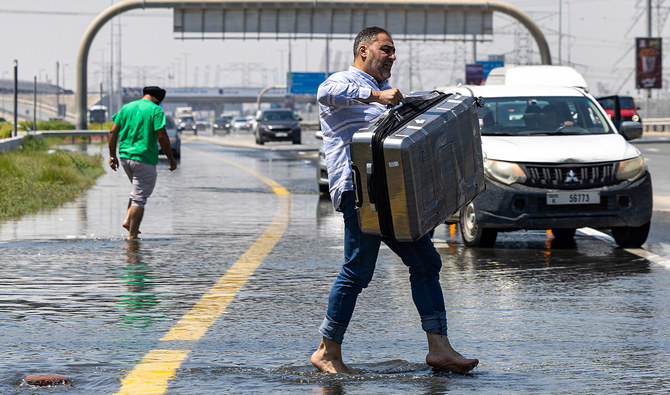
- Climate experts say warmer oceans lead to greater evaporation and warmer air can hold more water vapor
- Pakistan recorded double the amount of rainfall in April, while UAE received two years of rain in a single day
PARIS: Floods have been tearing a path of destruction across the globe, hammering Kenya, submerging Dubai, and forcing hundreds of thousands of people from Russia to China, Brazil and Somalia from their homes.
Though not all directly attributed to global warming, they are occurring in a year of record-breaking temperatures and underscore what scientists have long warned – that climate change drives more extreme weather.
Climate change isn’t just about rising temperatures but the knock-on effect of all that extra heat being trapped in the atmosphere and seas.
April was the 11th consecutive month to break its own heat record, the EU climate monitor Copernicus said on Wednesday, while ocean temperatures have been off the charts for even longer.
“The recent extreme precipitation events are consistent with what is expected in an increasingly warmer climate,” Sonia Seneviratne, an expert on the UN-mandated IPCC scientific panel, told AFP.
Warmer oceans mean greater evaporation, and warmer air can hold more water vapor.
Scientists even have a calculation for this: for every one degree Celsius in temperature rise, the atmosphere can hold seven percent more moisture.
“This results in more intense rainfall events,” Davide Faranda, an expert on extreme weather at the French National Center for Scientific Research (CNRS), told AFP.
In April, Pakistan recorded double the amount of normal monthly rainfall — one province saw 437 percent more than average — while the UAE received about two years’ worth of rain in a single day.
This, however, doesn’t mean everywhere on Earth is getting wetter.
Richard Allan from the University of Reading said “a warmer, thirstier atmosphere is more effective at sapping moisture from one region and feeding this excess water into storms elsewhere.”
This translates into extreme rain and floods in some areas but worse heatwaves and droughts in others, the climate scientist told AFP.
Natural climate variability also influences weather and global rainfall patterns.
This includes cyclical phenomenon like El Nino, which tends to bring heat and rain extremes, and helped fuel the high temperatures seen over land and sea this past year.
While natural variability plays a role “the observed long-term global increase in heavy precipitation has been driven by human-induced climate change,” said Seneviratne.
Carlo Buontempo, a director at Copernicus, said cycles like El Nino ebb and flow but the extra heat trapped by rising greenhouse gas emissions would “keep pushing the global temperature toward new records.”
Considering the overlapping forces at play, attributing any one flood to climate change alone can be fraught, and each event must be taken on a case-by-case basis.
But scientists have developed peer-reviewed methods that allow for the quick comparison of an event today against simulations that consider a world in which global warming had not occurred.
For example, World Weather Attribution, the scientists who pioneered this approach, said the drenching of the UAE and Oman last month was “most likely” exacerbated by global warming caused by burning fossil fuels.
ClimaMeter, another rapid assessment network who use a different methodology, said major floods in China in April were “likely influenced” by global warming and El Nino.
“It can be difficult to disentangle global warming and natural variability” and some weather events are more clear-cut than others, said Flavio Pons, a climatologist who worked on the China assessment.
In the case of devastating floods in Brazil, however, ClimaMeter were able to exclude El Nino as a significant factor and name human-driven climate change as the primary culprit.
Many of the countries swamped by heavy floods at the moment — such as Burundi, Afghanistan and Somalia — rank among the poorest and least able to mobilize a response to such disasters.
But the experience in Dubai showed even wealthy states were not prepared, said Seneviratne.
“We know that a warmer climate is conducive to more severe weather extremes but we cannot predict exactly when and where these extremes will occur,” Joel Hirschi from the UK’s National Oceanography Center told AFP.
“Current levels of preparedness for weather extremes are inadequate... Preparing and investing now is cheaper than delaying action.”
US supports Saudi crown prince’s visit to Pakistan amid regional diplomatic activities
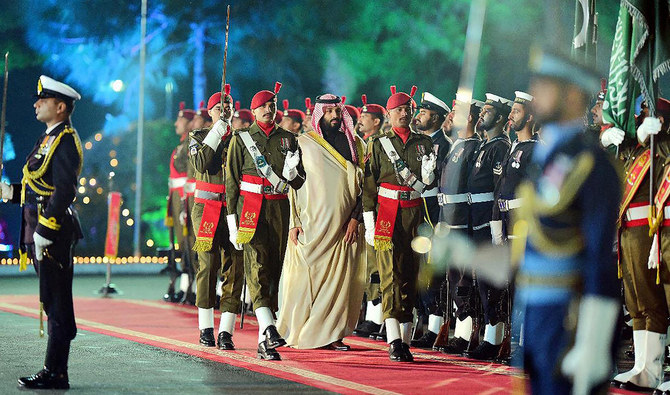
- Matthew Miller says the US always encourages diplomatic engagements among its partner countries
- He expresses skepticism over Ebrahim Raisi’s Pakistan visit due to Iran’s ‘destabilizing behavior’ in region
ISLAMABAD: The United States said on Tuesday it encourages diplomatic engagements among its partners and supports the upcoming visit of Saudi Crown Prince Mohammed bin Salman to Pakistan, expected sometime this month.
The statement by State Department Spokesperson Matthew Miller was issued in response to a question about diplomatic activities in the region, including Iranian President Ebrahim Raisi’s official tour of the South Asian state.
The Saudi crown prince’s visit to Pakistan is likely to occur amid high-level exchanges between the two countries, as Islamabad seeks foreign investment to address its economic challenges.
“We always support diplomatic engagement between our partners,” Miller said during a media briefing. “I don’t have any further comment on the visit between the Saudi crown prince to Pakistan, but it’s – that kind of diplomatic engagement is routine and something that we support and encourage.”
“But when it comes to Iran, of course, while we welcome regional de-escalation, we’ve seen the outbreak of limited conflict between Iran and Pakistan,” he continued. “We do remain skeptical about Iran’s intentions given its continued destabilizing behavior broadly in the region.”
Last month, Raisi arrived in Pakistan on a three-day official visit as the two neighbors sought to mend ties after unprecedented tit-for-tat military strikes in January. The visit also took place as tensions were running high in the Middle East after Iran launched airstrikes on Israel that retaliated with its own attack on Isfahan.
Pakistan and Iran are also working on a gas pipeline project agreed between them in 2009 amid the threat of US economic sanctions.
Pakistan’s Deputy Prime Minister Ishaq Dar said on Tuesday the government in Islamabad would continue to pursue its own interest as a sovereign state.
He also confirmed the Saudi crown prince’s much-awaited visit to Islamabad was on the cards and could materialize “any time” during this month.










